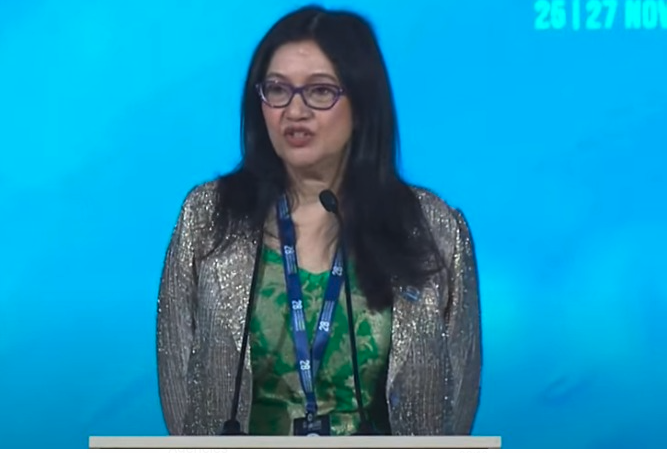RIYADH: Sustainability, technological disruption, and supply chain decentralization are redefining global investment dynamics, Saudi Arabia’s investment minister said at an event in Riyadh.
Speaking at the 28th World Investment Conference in Riyadh, Khalid Al-Falih noted that while the global economy is recovering from headwinds, challenges such as geopolitical tensions continue to create instability.
Running from Nov. 25 to 27, WIC 2024 is focused on digital transformation and sustainable growth, and unites global leaders to discuss investment policies shaping future economies.
Addressing attendees, Al-Falih said: “There are four major trends that will play a crucial role in shaping the global investment landscape. The first is the importance of investment in sustainability. The second is the unprecedented technological disruption unfolding in front of our own eyes.”
He added: “The third global trend is the steady reconfiguration of the global supply chain, with the decentralization of supply chains creating hubs in emerging regions that offer new opportunities for investments, infrastructure, and new production capacity.”
According to the minister, the fourth global trend is demographics, where entities will invest money where talent is available and consumption is high.
Al-Falih acknowledged both opportunities and challenges for global investment, citing issues such as geopolitical instability and trade barriers but emphasized progress in inflation containment, capital market growth, and consumer confidence restoration.
“We are confronted with crosswinds to global investments — driven forward on one hand by the tech revolution, booming stock markets, and the onset of promising monetary policies, while constrained on the other hand by geopolitical instabilities, trade barriers, and talent and skill shortages,” said Al-Falih.
“Let me remind all of us that investments require sound and deliberate stewardship,” he said.

Saudi Arabia’s investment minister Khalid Al-Falih. Screenshot
Saudi Arabia has made strides under Vision 2030, with gross domestic product up 70 percent to $1.1 trillion, with half of that driven by non-oil activities.
Al-Falih said that foreign direct investment flows have tripled, and over 550 international firms have established regional headquarters in the Kingdom, surpassing targets.
This came as the Kingdom offered businesses various incentives if they relocated their Middle East-bases to Riyadh, including a 30-year exemption from corporate income tax and access to discounts and support services.
In November, US-based Morgan Stanley secured approval to establish its regional headquarters in Saudi Arabia, followed by Citi Group.
The Kingdom also launched the premium residency program to welcome international investors and talented people. “In the last three years alone, 1,200 investors have been awarded these premium residencies, allowing them to be treated as if they are in their own countries,” said Khalid Al-Falih.
Global appreciation
At the conference’s opening ceremony, Nivruti Rai, managing director and CEO of Invest India and president of the World Association of Investment Promotion Agencies, lauded Saudi Arabia’s diversification efforts.
“Vision 2030 entails growth through technology, growth through greenification, and growth that also enables tourism, including spiritual tourism,” said Rai.
She added: “In 1938, Saudi Arabia discovered oil. I am so happy that today we are dreaming of NEOM, a smart city built on technology. To enable that, the one way — and only way — is to unite and ignite the passion that drives digital transformation and the passion that harnesses sustainability.”

Nivruti Rai, managing director and CEO of Invest India. Screenshot
Rai also highlighted the importance of a green future, noting the need for a mix of energy sources to sustain growth.
“We all have to work toward greenification, because the world knows that power is directly proportional to GDP. The input to growth is power,” she said.
Emergence of new markets
James Zhan, chair and executive director of the World Investment Conference, emphasized the transformative trends shaping the global economy.
“We are now witnessing the emergence of new markets, new funding sources, new business models, and new industries. All this offers immense potential for global investment promotion and business facilitation,” said Zhan.
WAIPA’s executive director and CEO, Ismail Ersahin, stressed the significance of WIC in fostering collaboration and actionable outcomes.
“World Investment Conference is not just a place where we share our experiences, but now we are also addressing investors and telling them, ‘Here are the opportunities, so you should participate,’” said Ersahin.
New investment paradigms
In a separate press statement, Ersahin said that WIC 2024 comes at an “important moment in the global economy,” noting that as the international community navigates the nuances of digital transformation and the push for sustainable growth, the event serves as an essential platform for leaders to explore new investment paradigms shaping the future.
He added: “The need for investment promotion agencies to drive economic development and foster foreign direct investment has never been more critical. By bringing together key global stakeholders in international development and investment, we are creating an environment where strategic partnerships and actionable solutions can flourish.”
The conference is hosted by Invest Saudi, the national investment promotion brand overseen by the Saudi Investment Promotion Authority, and focuses on scaling investment opportunities while offering participants practical tools and connections to drive impactful outcomes.
























